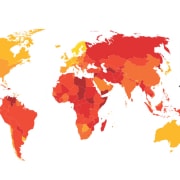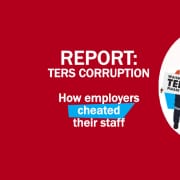|
Getting your Trinity Audio player ready...
|
The release of the Corruption Watch Covid-19 TERS Corruption at Work report today highlights the experiences of whistle-blowers short-changed by employers in delivering what was promised as temporary economic relief during Covid-19. The Temporary Employer / Employee Relief Scheme (TERS) was introduced during the national hard lockdown as one of a range of economic stimulus measures in response to the Covid-19 epidemic.
Its purpose was to provide support to employees whose possibility for work or providing services were curtailed during lockdown, as stipulated by the disaster regulations, under which only certain industry sectors and workers were regarded as essential. By 31 July 2020, a total of R37.1-billion had been disbursed from the Unemployment Insurance Fund (UIF) – but not all employees received the funds due to them.
“The Covid-19 pandemic has exposed the fault lines in our society, along with the weaknesses in how funds and benefits are administered, and whether they reach the intended beneficiaries,” says Karam Singh, head of legal and investigations at Corruption Watch. “Through this report, and as the TERS comes to a close, we hope to highlight measures that could be put in place to strengthen the operations of the UIF going forward.”
Ultimately, the aim is to prevent future mismanagement of critical payments that are supposed to provide immediate support, Singh adds.
The experiences of 126 whistle-blowers were reported to Corruption Watch, detailing failures in the administration of these funds and corrupt acts on the part of some employers.
Although the TERS fund has benefited many people since its introduction in March 2020, its administration has not been without complications. This has had a detrimental effect on targeted beneficiaries of the TERS, who were not supported as a result of mismanagement, and in some cases, outright corruption. These reports, therefore, still give cause for concern, and expose the gaps in the operations of the UIF that need to be addressed.
While the sample of reports represented here may seem like a drop in the ocean, they nonetheless provide important insight into the way that processes can be subverted and point to those implicated in disrupting the payment of benefits and the impact of their actions. These reports add to those already covered in the media and by the reports from the Auditor-General’s office.
Most reports received came from Gauteng (57), followed by Western Cape (15) and KwaZulu-Natal (12). The big metropolitan municipalities, namely City of Johannesburg (30), City of Tshwane (18), City of Cape Town (14), and eThekwini (9), led the way.
It is interesting to note that among the industry sectors represented were private security services, food and beverage services, fuel sales (petrol stations), transport and logistics, and construction.
The implicated parties included payroll officers, company finance personnel and managers, inspectors who took bribes to ignore labour rights breaches, and third parties who offered support to access benefits. The most common type of allegation was of employers receiving the TERS but failing to pay it over to the employees, followed by employers claiming a TERS benefit for employees who were, in fact, working. Other examples included partial TERS payments rather than the full amount due to employees, false claims, or failure to claim the TERS for those employees who were not working and therefore eligible.
The element of corruption was heightened by administration characterised by delays between the application and actual receipt of the TERS benefit, which meant that when the employee was in crisis, the benefit was not forthcoming. The sense of urgency arising out of the inability of employees to pay their expenses was therefore not taken into account.
It is a matter of concern for Corruption Watch that maladministration has clearly become an entrenched culture. In order to ensure that gaps in delivery of benefits of this nature are addressed in the future, the organisation proposes several recommendations. These relate to improvements in law enforcement, in the use of technology around responsiveness, better processes, and enhanced controls.
“The value of this retrospective view of how the TERS was distributed in unusual circumstances is that it documents the human impact of its failures and highlights how processes can be subverted, and who is to blame,” says Singh.
“Our aim is to ensure that those most vulnerable during periods of economic stringency have some recourse through existing funds and institutions to seek relief,” he concludes.
Download the Covid-19 TERS Corruption at Work report.
For media queries, please contact:
Phemelo Khaas: 083 763 3472 phemelok@corruptionwatch.org.za








